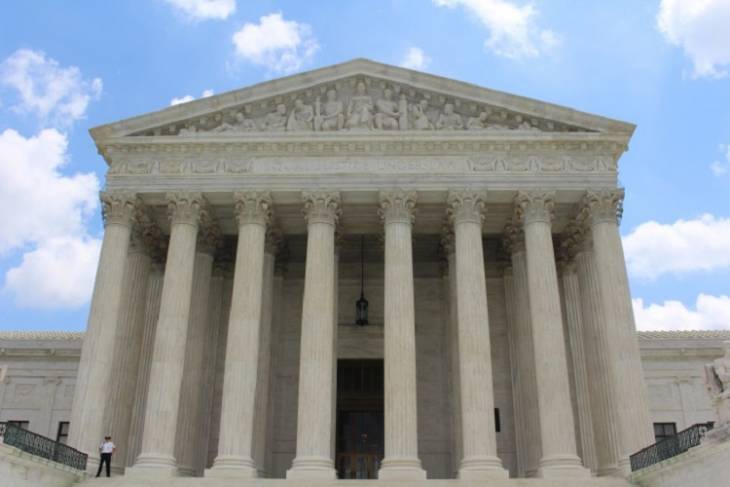What Are a Criminal Defendant's Constitutional Rights to a Fair Trial?

The U.S. Supreme Court Building, located at One First Street, NE, in Washington, DC. Photo: Claire Anderson/Unsplash
With populations rising across the world, many people tend to be involved in criminal activities, whether it is a misdemeanor or serious felony.
Most of these people are either put in state prisons or jailed depending on the crime committed and the circumstances behind their criminal activities. Unfortunately, others may be sentenced to life imprisonment and some to death.
For one to be arrested in California and places like it, he/she will either have committed a misdemeanor or a felony crime. Often, though not always, during the time of arrest and subsequent presenting an individual before a court, there must be a warrant for the arrest issued by a neutral judge or magistrate.
While police officers conduct arrests with authority and power, the criminal defendant must understand that they have constitutional rights guarding them.
Criminal Defendant's Constitutional Rights
As a defendant, it’s important to understand the criminal rights you have and can exercise should the need (or whenever the need) arises.
To better exercise and have your rights protected, it’s better to have a criminal defence lawyer. He/she can tell you that in all criminal prosecutions, a defendant should exercise the below rights:
1. The right to remain silent
The “right to remain silent” is well-known to anyone who watches TV shows and movies about police. You've probably heard the phrase, "You have the right to remain silent; Anything you say can and will be used against you in a court of law" when police are arresting people on films.
Well, those rights pronounced by the police may be based on the Fifth Amendment to the U.S. Constitution which states that “[n]o person...shall be compelled in any criminal case to be a witness against himself.” This constitutional right protects people from being compelled to give testimony that could incriminate them.
As a very general rule, no one is obligated to speak to the police and law enforcement officers can at no point force you to speak. Even the judge cannot force you to become a witness against yourself on any criminal case. But even non-verbal communication can, in some situations, be incriminating.
In some cases, when the defendant did not expressly invoke their Fifth Amendment rights to silence, the defendant’s silence and behavioral change has been used against them and upheald in court as incriminating evidence. Case in point, The Supreme Court’s decision in Salinas v. Texas, 570 U.S. __ (2013).
Be sure to expressly invoke and asert your constitutional right to remain silent so that you can be protected from incriminating yourself.
2. Right to have an attorney
In criminal cases, the defendant has a right to have a legal representative. According to the Sixth Amendment, defendant has the right to have counsel during "critical stages" of prosecution to ensure a fair trial for them.
If you cannot afford one, the government appoints an attorney at their expense. This is if there is a probability of being jailed and you cannot afford a lawyer.
If you cannot afford a lawyer, you should request the judge to appoint one during your first court appearance. But to qualify for a government appointed lawyer, some rules must be followed, such as gauging your financial status, your incomes and savings to determine whether you qualify for a public defender.
Similarly, all defendants have a Sixth Amendment right to decline the representation of counsel and proceed on their own behalf. Defendants who represent themselves are said to be proceeding pro se.
3. Right to a jury or a public trial
Under the Sixth Amendment, the fact that in criminal prosecutions you can be tried by an impartial jury selected randomly for the community gives you some hope. The best part is that your lawyer can point out the jurors he/she deems unfit who can lead to biasness.
Conversely, when a trial is done in public, there are so many policy reasons that may favor the defendant. For instance, the defendant family members, friends or the general citizens are always present. This ensures that the government can observe vital rights associated with trials. In other words, the government allows the general public to see that the justice system is fair and reasonable.
However, there are exceptions to this; the court may bar people from attending a case with the involvement of rape or child defilement. This is to protect the victim’s identity. Other times are when safety is a concern. For instance, if the case involves drugs and organized crimes, the court staff may require some safety.
4. Right to a speedy trial
In most states, there are laws governing the time within which you must be brought to trial. For instance, in California, you must be charged within 60 days of your arraignment if accused of a felony. This is not unless there is a good cause for delay.
Though sometimes there is no exact time, it’s the judge’s work to determine whether a case has been delayed and, consequently be thrown out.
Sometimes, however, the US constitutionally guaranteed right to a speedy trial is not always in the best interest of the defendant. In cases where the defense needs more time to prepare and do the work required to find favorable evidence and witnesses, for example, the defendant may waive the right to a speedy trial by making a written declaration.
5. Right to adequate representation
A defendant should have an attorney, but he /she should be represented judiciously and competely. This is especially true when it comes to plea bargaining or trial.
It becomes very frustrating when your lawyer seems reluctant to do an excellent job to explain the details of when you’re supposed to plead guilty or not.
If the representation is not effective, this may even cost you the chance to appeal. In this case, you should know you have a right to adequate representation and assert it.
6. Right to avoid double jeopardy
For criminal defendants, this crucial constitutional right to avoid double jeopardy protects individuals from being tried twice for the same crime. It is provided by a clause of the Fifth Amendment to the U.S. Constitution that states that no person can be convicted twice of the same offense.
You should not be subjected to the same offense and be in legal jeopardy twice. Once jeopardy has been completed, you cannot be detained or tried again for the same matter. That means you can add double jeopardy to your defenses and it could keep you out of jail.
7. Right to cross-examine witnesses
While not absolute, a criminal defendant has the right to cross-examine witnesses and query them dead-on their eyes. This right to cross-examine witnesses is enumerated in a clause of the 6th Amendment known as the Confrontation Clause.
The confrontation clause provides that "in all criminal prosecutions, the accused shall enjoy the right…to be confronted with the witnesses against him." This gives criminal defendants the opportunity to face the prosecution's witnesses in the case against them and dispute opposing witnesses' testimony.
The defendants right to confront and question the witnesses helps them maintain control over accusations and may help them dispel hearsay and rebut adverse witness testimony, which may ultimately be helpful to their case.
Protect Your Rights
If you are being investigated for a criminal activity or have been accused of committing a crime, make sure to understand and assert your rights. You may choose to hire a criminal defence lawyer to make the process easier and ensure the best outcome of your criminal proceedings.
A lawyer may help you have a comprehensive understanding of the law. This is important because criminal proceedings can be complicated.










![10 Luxurious Cities the World’s Billionaires Call Home [node:title]](/sites/default/files/styles/front_featured__front_/public/new-york-city-skyline.jpeg?itok=jWvAlaId)
![Asking Your Boss for a Raise or Time Off? Here’s The Perfect Time to Do It [node:title]](/sites/default/files/styles/front_featured__front_/public/boss-worker-asking-for-raise.jpeg?itok=qZ22krfS)
![What 'Work Influencers' Need to Know About Posting Corporate Content On Social Media [node:title]](/sites/default/files/styles/front_featured__front_/public/work-influencer-at-desk-camera-laptop.jpeg?itok=OlUKqZtC)

























